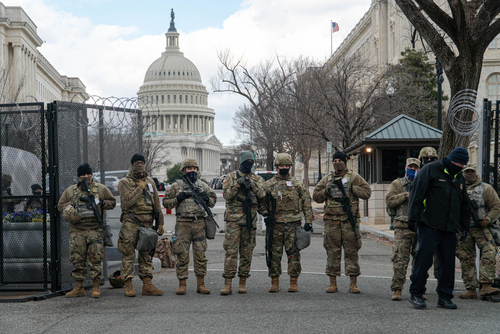
In the small town of Eagle Pass, Texas, a community of 28,500 residents is grappling with the realities of a burgeoning migrant crisis at the U.S. southern border. The influx of illegal migrants has not only overwhelmed local resources but has also drawn an unprecedented response from state and federal authorities, leaving the townspeople caught in the crossfire of a national political battle.
Eagle Pass has become a focal point for the country’s immigration debate, attracting lawmakers, celebrities, and journalists eager to weigh in on the situation. However, the attention has done little to alleviate the strain on the town’s infrastructure and the daily lives of its citizens. In January alone, the Del Rio sector, which includes Eagle Pass, reported a staggering 16,718 migrant arrests, highlighting the scale of the challenge facing the border community.
Something smells off about this whole situation at Eagle Pass in Texas. Is this a false flag operation? Is the government using this to set the stage for full martial law? pic.twitter.com/wWeBjEbJ4Q
— Armstrong Williams 🇺🇸 (@Arightside) January 26, 2024
The state’s response, led by Texas Governor Greg Abbott, has been robust and unapologetic. Operation Lone Star, a state initiative, has seen the deployment of National Guard troops and state troopers to secure the border and prevent illegal crossings. Shelby Park, a once-bustling local hub, now stands under state control, repurposed as a strategic point in the effort to stem the tide of illegal immigration.
Residents like Jessie Fuentes, a 63-year-old kayak business owner, have felt the direct impact of these measures. With the banks and parks leading to the Rio Grande under state control for over a month, Fuentes’ livelihood has been jeopardized, his services now primarily utilized by journalists covering the crisis. He, along with others in the community, has expressed frustration with Governor Abbott’s approach, which they perceive as indifferent to the plight of Eagle Pass locals.
The Texas town under 'martial law': Eagle Pass residents reveal how cops and troops are seizing their property and questioning locals as it stands at the epicenter of the migrant crisishttps://t.co/qEQN3FYA7v pic.twitter.com/FsV8FkfkLL
— Gloria Twiford (@audiegloria) February 11, 2024
Magali Urbina and her husband, owners of a pecan orchard on the Rio Grande, have had their property commandeered as part of the border enforcement efforts. Their land has been altered with bulldozing, locks, and concertina wire, a physical manifestation of the border crisis that has made their lives “miserable,” according to Urbina.
The presence of law enforcement and military personnel has extended beyond the immediate border areas. Local businesses, hotel parking lots, and even chain restaurants have become makeshift bases for the influx of state troopers and soldiers. The community has had to adapt quickly, with major events planned for Shelby Park, such as a festival in March and a solar eclipse in April, now in jeopardy, potentially affecting up to 50,000 visitors.
Despite the intense political climate and the visible presence of those opposing illegal immigration, there has been a noted decrease in the number of migrants attempting to cross the border in recent months. This decline is attributed to concerted efforts by U.S. and Mexican authorities to disrupt smuggling networks, particularly those transporting Venezuelan migrants.
Eagle Pass stands as a testament to the complexities of the immigration issue in America. While the town’s residents endure the consequences of being at the epicenter of this crisis, the broader implications of border security and immigration policy continue to be debated at the national level. As the situation evolves, the people of Eagle Pass remain hopeful for a resolution that balances the need for security with the well-being of their community.









